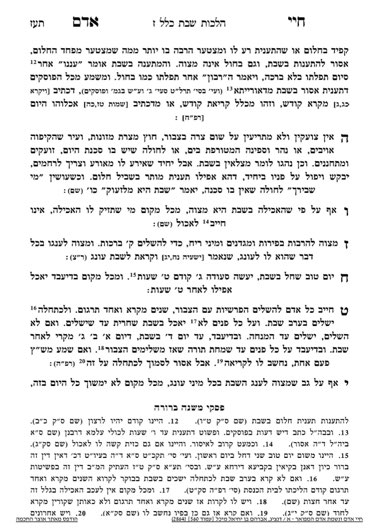The current series, which will cover seudos Shabbos and fasting on Shabbos, is available for sponsorship. Please contact Rabbi Reingold for more information.
We are continuing siman 5, discussing permitted bakashos of an individual on Shabbos.
Bakashos for ruchniyus, which are not for physical needs, are muttar to recite on Shabbos. One may even say them in a singular language. However, crying for ruchiyus needs on Shabbos is inappropriate.
The Mishnah Berurah writes that bakashos which are part of the standard nusach of tefillah, such as the harachamans in birchas hamazon, are muttar to recite since they are part of the standard nusach of tefillah.
A tefillah which was instituted specifically to be a bakasha for tzaros is inappropriate to recite on Shabbos. For example, Avinu Malkeinu is not recited on Shabbos Yom Kippur, because it was instituted specifically for times of tzara.
If a person wants to recite Tehillim and have a specific purpose in mind, it is muttar, since they are saying Tehillim, which was not specifically written as a bakasha. However, if they will cry because of the Tehillim, they should not recite Tehillim.
If it is an immediate need, such as a dangerously ill person or an immediately dangerous public situation, even public tefillah is allowed. This is true even if one is only davening for a single individual. It is only permitted if there is an immediate danger, i.e., a choleh sheyesh bo sakana which has a crisis. Similarly , if there is a public need which has immediate danger, one may daven b’tzibbur for that. However, even for a choleh who is deathly ill, but there is no immediate concern, one may only daven privately but not publicly. This is also true for a need of the tzibbur which is dangerous, but not imminent, that one is only allowed to daven privately, but not as a tzibbur.
One should not daven for a sick person who is not dangerously ill on Shabbos (choleh she’ein bo sakanah), but rather keep their tefillos for during the week.
If a person wants to cry on Shabbos because they are bothered by something, and they feel that crying will allow them to move past it, the Rema writes in siman 288:2 that it is permitted to cry. Similarly, the poskim suggest that if a person is experiencing a personal struggle, and they feel they will be able to relieve themselves by talking to someone about it, it is part of this person’s oneg Shabbos to talk about it, and it is muttar. Otherwise, discussing distressing things on Shabbos is assur.
One is allowed to recite tehillim and insert specific bakashos for an immediately dangerous situation on Shabbos.
Regarding the mi shebeirach for a choleh, some differentiate between a choleh she’yeish bo sakanah and a choleh she’ein bo sakanah, but the Mishnah Berurah does not differentiate. To explain the Mishnah Berurah, some suggest that there is a difference between a bracha and a tefillah, and the MIshnah Berurah understands the mi shebeirach as a bracha, so it is muttar to recite it even for a choleh she’ein bo sakanah. That being said, the primary understanding in halacha is that one should not recite the mi shebeirah for a person who is a choleh she’ein bo sakanah, but one can rely on the Mishnah Berurah.
Summary
- It is muttar to recite personal bakashos for ruchniyus on Shabbos, but not to cry for them.
- Bakashos which are part of the standard nusach tefillah are muttar to recite.
- A tefillah which is specifically for a time of tzara should not be recited on Shabbos, unless there is an immediate dangerous situation.
- In an immediate dangerous situaiton, one may recite tehillim and recite specific bakashos regarding the situation, and even as a tzibbur.
- If crying or speaking to someone will help relieve a person’s pain, they may do so on Shabbos.
- Otherwise, crying or discussing painful situations are assur on Shabbos.
- It seems to be appropriate to only recite the mi shebeirach for cholim over a choleh she’yeish bo sakanah; however, the Mishnah Berurah allows it to be recited for any choleh.



